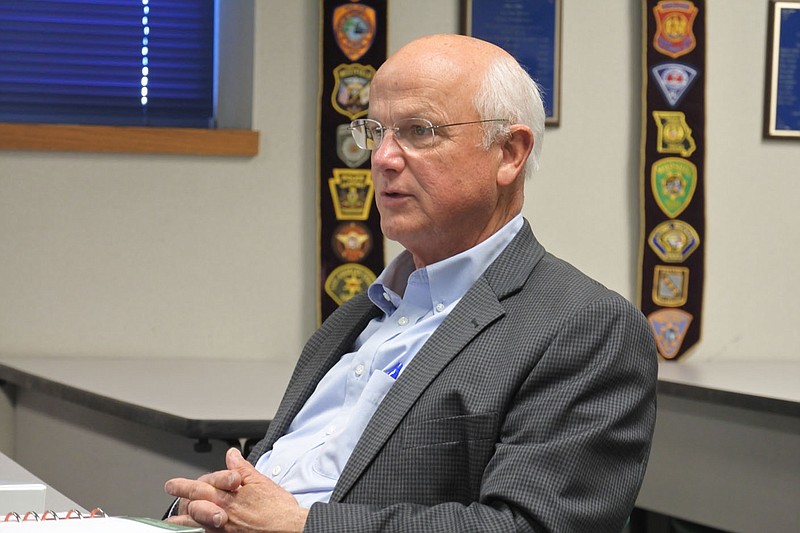FORT SMITH -- A full consolidation of the 911 system in Sebastian County was determined through a study to be both operationally and technologically feasible, with potential cost savings on the table.
Crystal Lawrence of the Florida-based Association of Public-Safety Communications Officials International (APCO) briefed the Sebastian County 911 Board on Wednesday on the consolidation feasibility study her company conducted. Her presentation included some of the findings from the study, as well as recommendations for the 911 Board on how to proceed with consolidation.
County Judge David Hudson previously told the Northwest Arkansas Democrat-Gazette the study's objective was to allow the county to have the most effective and efficient response possible for emergency services.
This study also comes after the Arkansas Legislature passed the Public Safety Act of 2019 a couple of years ago, which sets goals on reducing the number of call centers in Arkansas.
Call centers, also known as emergency communications centers, handle individual emergency service units, including police, fire and ambulance.
Sebastian County has the county sheriff's office and Fort Smith Police Department as its primary call centers, along with a secondary call center in Fort Smith EMS. The Sebastian County Emergency Operations Center in Fort Smith can also be used as a call center if any of those three fail.
APCO collected a variety of data and information about each of these centers as part of its consolidation study, which included site visits this past summer. The study is dated Oct. 1.
Lawrence said consolidating the county's three call centers could lead to service level improvements such as faster response times by eliminating the need to transfer 911 calls, among other things.
Potential financial benefits from consolidation would come from reducing and eliminating redundant maintenance costs, as well as duplication. Lawrence noted each of the three centers is paying a maintenance contract pertaining to technology.
"I don't want to say that consolidation is definitely a money saver," Lawrence said. "You're going to have to crunch the numbers, and many times, upfront, it is a bigger cost, and that cost savings is not realized until several years down the road."
Other potential benefits of consolidation Lawrence mentioned included enabling the standardization of service levels for people in the county, improved training and the expansion of career opportunities.
Lawrence said her company determined through this study that, out of the four common models of consolidation, a full consolidation appears to be the most appropriate for Sebastian County and Fort Smith.
The study defines this as a model that consolidates all phone calls and dispatch functions in an area into a single agency at one or multiple locations under one governing body. However, this would depend on the 911 Board acquiring a suitable facility or expanding an existing facility.
Lawrence said now that the feasibility study is finished, the next step for the 911 Board is to undergo a planning phase for the consolidation. This will involve making decisions regarding participation, funding formulas, facilities and technology needs, as well as the organizational structure and governance model for the consolidated center and human resources issues such as salary and benefits.
"This process can be organized and facilitated and will require agency leaders to commit to regular discussions until all the decisions are finalized," Lawrence said.
APCO's recommendations on how to move forward with this initiative included those in the fields of governance, operations, facilities, technology, staffing and finance. The planning phase of the consolidation would then be followed by an implementation/transition phase and a post-consolidation phase, according to Lawrence.
Hudson said after the meeting he would be in contact with Fort Smith City Administrator Carl Geffken and others to work on preliminary steps in the wake of these recommendations, the results of which will be reviewed by the 911 Board.
"And we'll also be looking at best practices and other examples so we're not starting with a blank piece of paper," Hudson said. "But we have a very comprehensive report that we can continue to refer to for direction and guidance, and so that will be helpful."
Jeff Turner, county administrator, said the feasibility study cost the county $35,000.
Call volumes
More News
NoneThe call center at the Sebastian County Sheriff’s Office received 13,070 emergency calls and 78,500 nonemergency/administrative calls in 2020, which comes to a total of 91,570 calls. The Fort Smith Police Department call center got 57,045 emergency calls and 150,960 nonemergency calls that same year while the Fort Smith EMS call center received 14,407 emergency calls and 49,928 nonemergency calls, resulting in totals of 208,005 and 64,335 respectively.
Source: Association of Public-Safety Communications Officials International
